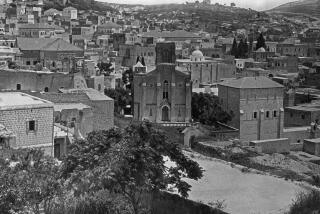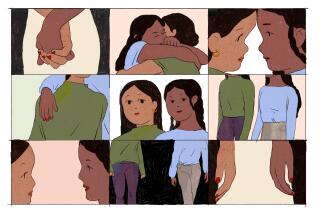Cousins at War Need Elders’ Intervention
The causes and solutions of war between Eritrea and Ethiopia in the Horn of Africa have eluded diplomats and heads of state, ranging from Bill Clinton to Moammar Kadafi. Bombs were released over Asmara, the capital of Eritrea, and Mekele, the capital of Ethiopia’s northern region, a week ago; 2,000 foreigners have fled and hundreds of combatants from both countries are dying in battles reminiscent of World War II’s El Alamein.
Even the leaders of the warring countries, Meles Zenawi of Ethiopia and Isaias Afwerki of Eritrea, seem baffled about the forces that have led them to the brink of mutual annihilation. Analysts have observed that Ethiopia and Eritrea were close allies as recently as eight months ago. Disputes concerning the correct location of old colonial borders or economic tensions caused by Eritrea’s new currency have obscured a fact that is increasingly apparent: The enmity between these two countries must be old and deep, or else we would not be witnessing this tragic turn of events.
The roots of this war go back as far as 1888, when Italy created its colony of Eritrea out of a collection of warring chiefdoms along the Red Sea. During its 60 years as a colony, some Eritreans who despised the colonial regime sought unification with Ethiopia. The majority of Eritreans, however, adjusted to the modern roads, technology and industry, which the Italians installed for their own benefit. Blessed with more schools and higher literacy than their cousins to the south, the Eritreans cooperated with Mussolini’s conquest of Ethiopia. Brief though it was, the five-year Fascist occupation, from 1936 to 1941, was a collaboration for which the Amharas, who dominated Ethiopia, never forgave Eritreans.
Eritrea’s history for 50 years after Mussolini’s defeat was really a saga of Ethiopia extracting its revenge.
* In the first stage (1941-52), the British military administration, with encouragement from Ethiopia and the U.S., suppressed all attempts at Eritrean self-rule.
* In the second stage (1953-62), a jury-rigged confederation created by the U.N. and dominated by Ethiopian Emperor Haile Selassie dismantled the nascent democratic institutions of Eritrea.
* In the third stage (1962-74), the Ethiopians tried to consolidate their grip on Eritrea, illegally declaring it a province, canceling a U.N. plebiscite and imposing the Amhara language and culture on increasingly rebellious Eritreans.
* In the final stage (1974-91), Ethiopia’s Marxist regime, after overthrowing the emperor, sponsored eight major offensives against the Eritrean rebels. This bloody war, to which most of the world remained oblivious, succeeded only in distracting Ethiopians from their misery and congealing Eritrean nationalism to the point that the rebels defeated each offensive against overwhelming odds.
Although peace and development have prevailed in Ethiopia and Eritrea for the past seven years, the current conflict should be seen as an attempt to resolve unfinished business left over from the liberation struggle. One of the unanswered questions is how freely goods should flow from Eritrea’s ports to and from Ethiopia’s landlocked interior. Another is the pace and character of each country’s transition from socialism to free-market economics. A third is how Ethiopia and Eritrea should define their foreign relations, given the instability and aggressive tendencies of neighboring countries.
One fundamental question hanging in the air seems to be: To whom does Eritrea “owe” its freedom? The Tigrayans dominating Ethiopia’s single-party government believe that they “rewarded” Eritrea with independence during the negotiated settlement in 1991. But Eritreans point to the facts on the ground: They had functioned as an undeclared nation for nearly a decade. Eritrea’s liberation army trained the rebel groups in Tigray that eventually overpowered Mengistu Haile Mariam. In a real sense, Ethiopia owes its freedom to Eritrea, rather than the other way around.
A fundamental cultural difference is apparent to all who visit both countries. Ethiopia is a swirling caldron of competing ethnic groups and dissidents, patched together by Meles (who has few equals as a negotiator) and his Tigray-based Ethiopian People’s Revolutionary Democratic Front. Beneath Ethiopia’s scruffy modernism lies an intractable feudal culture, still resistant to education, significant parts of which long for a return to empire and religion.
Eritrea’s culture is by contrast confidently post-colonial, disciplined by sacrifice, staunchly moralistic, still vaguely organized along military lines. The burdens of nationhood are well understood by Eritreans, who will defend their hard-won independence to the last inch.
It is obvious to anyone that there will only be losers in this war. Even so, Eritrea’s Isaias has complained about the peace process initiated by Susan E. Rice, assistant secretary of state for African affairs, a 33-year-old protege of Secretary of State Madeleine Albright.
“[The Americans] believe in quick fixes and bulldozing and that does not work,” Isaias said. “It is not in our culture. . . . We have our own values and traditions, prestige and pride.”
I asked an Eritrean friend how, in his culture, the problem of two cousins fighting with each other would be resolved. “We have what is called a baito, a village court called to handle disputes. The shimagele (elders, invariably old men with white hair or no hair at all) will ask each cousin to air their complaints before the village. After all has been explained, the elders ask the people in the village to talk. Then, when all the talking is done, the elders demand that the cousins shake hands, kiss and go home to fight no more.”
Who are the shimageles who will air this dispute and end this feud in the Horn of Africa? Our “village” should call a baito soon, or two worthy cousins will end up destroying each other.
More to Read
Sign up for Essential California
The most important California stories and recommendations in your inbox every morning.
You may occasionally receive promotional content from the Los Angeles Times.










